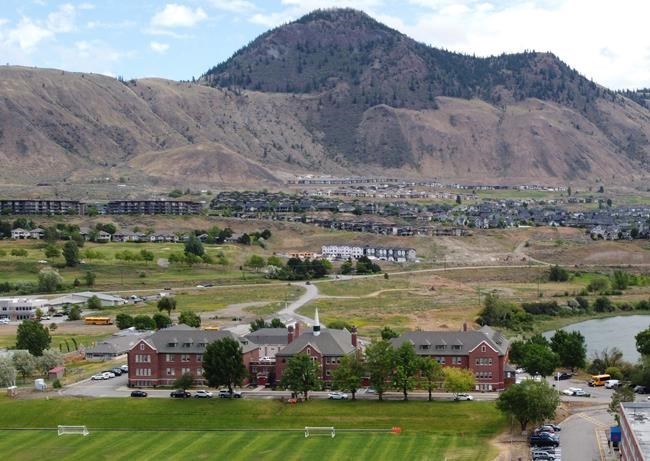
The Kamloops Residential School is photographed using a drone in Kamloops, B.C., Monday, June, 14, 2021. Responding to complaints from an Indigenous girl and her mother, the Nova Scotia government has deleted a section from a high school correspondence course that asks students to list the positive attributes of the residential school system. THE CANADIAN PRESS/Jonathan Hayward
Republished June 18, 2021 - 11:47 AM
Original Publication Date June 18, 2021 - 9:06 AM
HALIFAX - Responding to complaints from an Indigenous girl and her mother, the Nova Scotia government has scrapped a high school correspondence course that asked students to list the advantages of the residential school system.
Malaika Joudry-Martel and her mother shalan joudry — a Mi'kmaq poet who writes her name with lowercase letters — were reviewing the chapter on First Nations on Wednesday when the 15-year-old warned her mother that some of the content in the English course was racist.
One assignment asked students to list in chart form the benefits and disadvantages of being placed in a residential school.
"I just froze," joudry said in an interview Friday from her home on the Bear River First Nation.
"I thought, no, we removed this years ago from the Canadian curriculum .... That activity makes it seem as though there could be a balance, that there are advantages to that legacy."
The 170-page course offered other "passively racist" content, she said, including questions asking why poverty, alcoholism and unemployment are common among First Nations populations.
Given the recent reports from Kamloops, B.C., where Tk'emlups te Secwepemc First Nation discovered what are believed to be the remains of 215 children at the former residential school there, it's impossible to associate anything good with that system, joudry said.
"What is surprising is that in 2021, course material approved by the minister of education and sent to my daughter — a Mi'kmaq student — was encouraging her to talk about the advantages of these schools," she said.
"When I read those questions, it does not look like they are asking the students to be critical thinkers. What this is doing is reinforcing negative stereotypes."
On Wednesday, she posted excerpts from the course on her Facebook page. Education Minister Derek Mombourquette confirmed Friday that he called the family Thursday to apologize for the hurtful content, and he committed to reviewing all correspondence courses to ensure no similar material exists.
"I will apologize to the Mi'kmaq community and the larger Indigenous community across Canada," the minister said in an interview from Cape Breton, where his electoral district includes the Membertou First Nation.
"I have reached out to a number of Mi'kmaq leaders since this took place .... As minister of education, I'm reaffirming my commitment to ensure ... that our education system is truly reflective of our history and the culture of the Mi'kmaq in Nova Scotia."
There were 74 other students in the course, which has been offered with the existing content since 2003, the minister said.
Mombourquette said he was devastated when he saw joudry's Facebook post.
"I really want to thank them for coming forward with this," he said. "It does not reflect what our curriculum is in Nova Scotia. We take the recommendations of the Truth and Reconciliation Commission very seriously."
The commission's final report in 2015 documented the cruel history and legacy of the schools, concluding they were devoted to "cultural genocide." As well, the commission compiled a list of 4,100 students who died of disease or accident while attending one of the church-run, government-sponsored schools, which operated for 120 years.
In all, about 150,000 First Nations, Inuit and Métis children attended the schools. For those Indigenous families who resisted the system, children were forcibly taken by the RCMP. The 130 schools became infamous as places where many students suffered emotional, physical and sexual abuse.
They were also known for overcrowding, poor sanitation, unhealthy food and menial labour. Harsh punishment was meted out for those who spoke their native language or took part in traditional rituals.
"There's still work to do to educate the educators," joudry said. "What's disturbing to my 15-year-old daughter is that there are other students who now have this misinformation running around in their minds in 2020, 2019 and so on."
This report by The Canadian Press was first published June 18, 2021.
News from © The Canadian Press, 2021